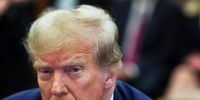On August 21, 2025, a divided New York appellate court delivered a stunning verdict in the long-running civil fraud case against President Donald Trump, vacating a nearly half-billion-dollar penalty but upholding the underlying fraud judgment and other business restrictions. The five-judge panel’s decision, coming almost a year after oral arguments and seven months into Trump’s return to the White House, has sent shockwaves through legal and political circles, fueling fierce debate over the meaning and impact of the ruling.
The case, brought by New York Attorney General Letitia James in 2022, accused Trump and his company of inflating his net worth on financial statements for a decade, from 2011 to 2021, to secure favorable loans and insurance terms. The lawsuit, which also named Trump’s two eldest sons, Donald Trump Jr. and Eric Trump, as well as top Trump Organization executives, culminated in a February 2024 ruling by New York State Supreme Court Judge Arthur Engoron. That ruling found Trump and his companies liable for fraud, ordering nearly $355 million in penalties—an amount that, with interest and additional penalties for his sons, ballooned to more than $527 million by this summer, according to court documents cited by The Hill and Gray DC.
The appellate court’s Thursday decision, however, threw out the massive financial penalty, declaring it an “excessive fine that violates the Eighth Amendment of the United States Constitution.” In its principal opinion, Justice Peter Moulton wrote, “Trump did harm in inflating his assets, but it was not the cataclysmic harm that can justify a nearly half-billion-dollar award.” The court’s ruling means Trump and his associates are no longer on the hook for the enormous civil penalty, a result the former president and his family immediately celebrated as vindication.
“TOTAL VICTORY in the FAKE New York State Attorney General Letitia James Case!” Trump posted on Truth Social shortly after the ruling. “I greatly respect the fact that the Court had the Courage to throw out this unlawful and disgraceful Decision that was hurting Business all throughout New York State.” Eric Trump echoed the sentiment on X, declaring, “Total victory in the sham NY Attorney General case!!! After 5 years of hell, justice prevailed!”
Yet, the celebration belies a more complicated legal reality. While the penalty was vacated, the appellate panel unanimously upheld the lower court’s finding that Trump, his company, and his two eldest sons engaged in fraud. The judges also left in place non-monetary sanctions, including a ban on Trump, Donald Trump Jr., and Eric Trump from serving in corporate leadership roles in New York for several years, and ongoing court-appointed monitoring of the Trump Organization’s business practices. As The New York Times noted, the “jumble of rulings” marked both a “financial victory” and a “measure of legal validation” for Trump, but also a “remarkable turn” in his battle with Attorney General James.
The panel itself was sharply divided on the merits of the case. Two justices—Dianne Renwick and Peter Moulton—supported affirming fraud liability, stating that “the trial record supports the lower court’s finding that Donald Trump Jr. and Eric Trump possessed the requisite intent to defraud,” as reported by The Hill. Two others—John Higgitt and Llinét Rosado—argued for overturning the fraud findings and ordering a new trial. The fifth justice, David Friedman, contended the case should have been dismissed outright. Ultimately, the fraud finding was “affirmed” only because Higgitt and Rosado voted with the majority to avoid a deadlock, ensuring a final decision could be issued, according to The Wall Street Journal and other outlets.
Attorney General Letitia James, undeterred by the vacated penalty, vowed to appeal the ruling to New York’s highest court. In a statement, she said, “The First Department today affirmed the well-supported finding of the trial court: Donald Trump, his company, and two of his children are liable for fraud. The court upheld the injunctive relief we won, limiting Donald Trump and the Trump Organization officers’ ability to do business in New York. It should not be lost to history: yet another court has ruled that the president violated the law, and that our case has merit. We will seek appeal to the Court of Appeals and continue to protect the rights and interests of New Yorkers.”
The legal saga began in 2022, when James filed suit alleging that Trump and his family had repeatedly overstated the value of their properties on key financial documents, reaping benefits from lenders and insurers. The allegations made James one of Trump’s most prominent adversaries and a frequent target of his public attacks. The trial itself was a media spectacle, with Trump repeatedly using the courtroom as a platform to rail against prosecutors and the judge, whom he labeled “corrupt” following the initial verdict, as reported by Gray DC.
The appellate court’s decision comes at a politically charged moment. Trump, now back in the White House, remains a convicted felon from a separate hush money case, as noted by Gray DC. The civil fraud case, meanwhile, continues to cast a long shadow over his business empire and his political fortunes. James’ announcement of an appeal means the legal battles are far from over. The appellate panel’s split—particularly its inability to reach a clear consensus on the merits of the fraud findings—makes it almost certain that New York’s top court will be called upon to weigh in, as observed by The Wall Street Journal.
The ruling has sparked fierce debate among legal experts and political observers. Some argue that the decision strikes an important balance, recognizing wrongdoing but rejecting a penalty they view as disproportionate. Others worry that vacating the financial penalty could embolden corporate actors to skirt the law, knowing that even proven fraud need not result in hefty fines. In the words of Justice Moulton, “it was not the cataclysmic harm that can justify a nearly half-billion-dollar award,” highlighting the challenge courts face in calibrating punishment to fit the crime.
As the dust settles, one thing is clear: the legal and political battles surrounding Donald Trump are far from over. With Attorney General James pressing her appeal and the Trump Organization still facing business restrictions, the story of Trump’s financial dealings in New York will remain in the headlines—and the courts—for months, if not years, to come.


